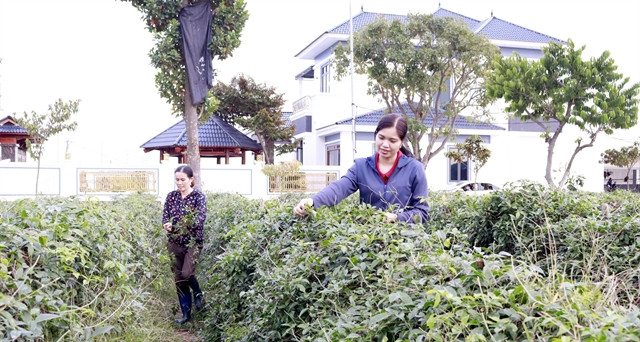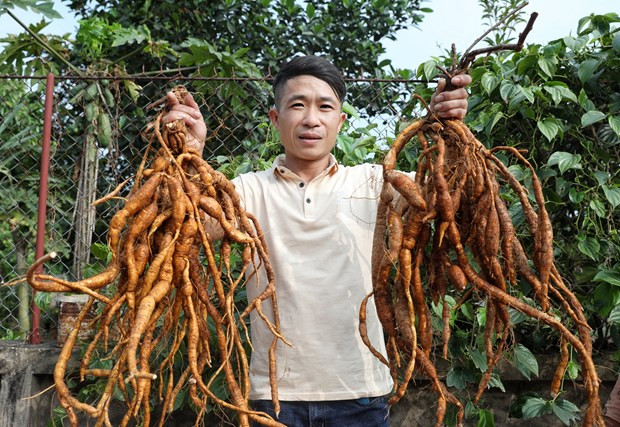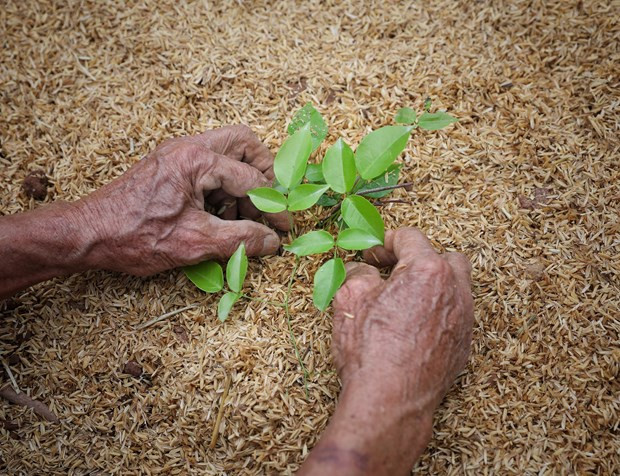 |
|
Nguyễn Thị Kim Dung (right) visits a ginseng garden. |
With the desire to preserve and promote the potential of the ginseng grown on Dành Mountain, Nguyễn Thị Kim Dung, director of the Ginseng Production and Consumption Cooperative in northern Bắc Giang Province, has devoted a lot of enthusiasm to developing the plant.
She recently won the second prize at the 2023 National Women's Startup Contest organised by the Vietnam Women's Union with her ginseng startup project.
Southern ginseng which was found on the mountainside has various uses. Some farmers brought it back to plant in Liên Chung Commune, Tân Yên District.
After graduating from university majoring in agricultural extension and rural development, Dung returned to work as an agricultural extension officer in 2011 when Liên Chung was the poorest commune in the district, with local people's income mainly coming from agriculture.
She realised that some households still grew the southern ginseng plant - a precious plant recorded in history books as once being a "product presented to the King".
Discovering its high economic value, she aspired to develop and expand the growing area, turning this crop into a plant to eliminate hunger and reduce poverty.
In 2019, Bắc Giang Provincial Plant Breeding Centre researched and selected top-line plants for propagation.
By the end of 2020, Dung gathered ginseng growing households in the commune to establish the Ginseng Production and Consumption Cooperative with 17 members planting ginseng on an initial area of 4.5 hectares.
The cooperative looks to link farming households to jointly produce ginseng in an organic and environmentally-friendly way, thereby promoting, introducing and creating many products from ginseng, contributing to improving the economic value of this crop, Dung said.
During its first stage, many cooperative members were worried about the plant growing direction, especially the ginseng sales output, due to lack of investment and technology. The cooperative's products must compete with long-known products such as Ngọc Linh ginseng and Korean ginseng.
 |
| It takes about 5 years for ginseng to produce roots. One kg of fresh ginseng costs about VNĐ2 million. - VNA/VNS Photo Danh Lam |
Dung applied her knowledge and experience to mobilise members to overcome difficulties and expand ginseng growing area.
She participated in training courses, workshops and trade promotion fairs to improve her qualifications to inspire other farmers.
In 2021, the cooperative harvested its first ginseng flower crop and sold it at a high price, an average of VNĐ1 million VND per kg of dried flowers.
This gave cooperative members more confidence in their direction.
After nearly three years, the cooperative has developed many quality ginseng products that are trusted and used by consumers.
The cooperative expanded its own area to 20 hectares and linked with other members in the commune to increase the total area of ginseng in the entire commune to 45 hectares.
 |
| A variety of Dành Mountain ginseng. VNA/VNS Photo Danh Lam |
A ginseng production area that meets VietGAP standards with an area of 5 hectares has been formed.
Dung and other farmers also plan to build a 5ha production area that meets organic standards.
In 2021, the product "Southern mountain ginseng" was granted geographical indication protection by the National Office of Intellectual Property.
Dung said the quality of Dành Mountain gingsen can be compared to Korean ginseng, and ranks only behind Ngọc Linh ginseng.
All parts of the ginseng plant - leaves, stems, flowers and tubers - are utilised to make other products.
Every ginseng flower season lasts about 1.5 months, from late August to mid-October. One hectare of ginseng will yield about VNĐ150 - 200 million on average from flowers per year.
After five years, the profit from ginseng is estimated at VNĐ3 billion per ha.
To meet customer’s demand, the cooperative has diversified products from ginseng including ginseng flower buds, fresh or dried ginseng roots, and ginseng roots soaked in honey and wine.
It is developing the Tân Yên ginseng chicken model in which ginseng stems and leaves are ground and mixed. About 5,000 to 10,000 chickens are expected to be raised each season.
The first chickens fed ginseng have shown their disease resistance and high meat quality, and are sold at a price VNĐ10,000 - 20,000 higher than others.
Dung said that raising chickens with this method limits the use of antibiotics in livestock farming. It is expected that in the next Lunar New Year, the cooperative will sell about 10,0000 ginseng chickens on the market.
“We are completing the criteria to put ginseng chicken products for sale at supermarkets and clean food stores by the end of this year,” she said.
Helping women be economically-independent
Since 2020, when the ginseng growing area was expanded to the entire commune, Liên Chung people, especially women, have gained additional income from this crop.
The cooperative has created jobs for 35 women with a monthly income of VNĐ5-7 million each person.
During the peak season, as many as 200 workers with payment of VNĐ300,000 – 500,000 are hired per day.
Hundreds of households in the commune have switched to growing ginseng to replace low-yield plants.
Dung said many people in other localities such as Nghệ An, Đắk Nông and Quảng Ninh have bought the mountain ginseng varieties to plant in their areas.
She hoped that the mountain ginseng will be developed into a national product which can compete with Korean ginseng and becoming the pride of Bắc Giang. — VNS